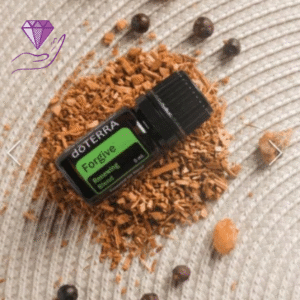How Massage Therapy and Essential Oils Can Promote Forgiveness
Forgiveness is often seen as one of the hardest yet most liberating acts we can undertake. Whether we’re holding onto resentment toward ourselves or someone else, the process of letting go can be both emotional and physically taxing. Interestingly, massage therapy and essential oils have been found to complement forgiveness practices by helping individuals release tension, reduce stress, and create mental clarity. 
This blog will explore how massage therapy and essential oils can support emotional healing like forgiveness. You’ll also learn about specific techniques and oils that may enhance your self-care routines.
The Connection Between Forgiveness and Physical-Being
Holding onto negative emotions like anger or resentment doesn’t just affect your mental state. Research indicates that unresolved emotional pain can manifest physically, contributing to issues like muscle tension, headaches, and poor digestion. Forgiveness, on the other hand, is linked to lower stress levels, improved heart health, and even decreased chronic pain.
Massage therapy and essential oils work synergistically to address the mind-body connection. Here’s how they can support your forgiveness practice.
How Massage Therapy Aids Emotional Release
Releasing Tension Through Touch
Massage therapy targets areas of physical tension that often correlate with emotional stress. For instance, people who hold onto resentment may experience tightness in their shoulders, neck, or back. A therapeutic massage can help release this accumulated tension, signaling to your body that it’s safe to enter a state of relaxation.
Popular massage techniques for emotional release include:
- Swedish Massage: Focuses on calming the nervous system, making it easier to process emotions.
- Symphany of Cells Aromatherapy: an add-on service to your massage using essential oils to bring harmony to your well-being.
- Deep Tissue Massage: Targets deeper layers of muscle to uncover and release lingering physical tension.
PROMO CODE FOR A COMPLIMENTARY aromatherapy forgiveness treatment with a relaxation massage booking.
ONLY SELLING 10!
Stimulating the Parasympathetic Nervous System
Forgiveness requires mental clarity, and massage helps by activating the parasympathetic nervous system. Known as the “rest and digest” mode of the body, this state promotes calmness and reduces cortisol (stress hormone) levels. The clarity that arises from this relaxed state can help facilitate forgiveness, allowing you to shift from a reactive mindset to a more thoughtful and intentional one.
Amplifying Forgiveness with Essential Oils
Essential oils, derived from plants, are widely regarded for their ability to influence emotions thanks to their complex aromatic compounds. These oils can be diffused, applied directly to the skin (when properly diluted), or even inhaled to support relaxation and emotional clarity.
The Science Behind Aroma and Emotion
Research in aromatherapy suggests that essential oils interact with the limbic system in the brain, which governs emotions and memory. This connection makes essential oils a valuable tool for working through past hurts and fostering forgiveness.
Top Essential Oils for Emotional Healing and Forgiveness
- Lavender
Known for its calming properties, lavender helps soothe anxiety and release tension. It’s a great starting oil for those new to aromatherapy.
-
- Usage Tip: Add 3–5 drops to a diffuser during a reflective moment to encourage relaxation.
- Frankincense
This sacred oil is often used to promote mental clarity and spiritual connection, making it ideal for forgiveness practices that require introspection.
-
- Usage Tip: Mix with a carrier oil and apply to your wrists or temples during meditation.
- Ylang Ylang
With its sweet and uplifting aroma, Ylang Ylang helps reduce anger and encourage peace of mind.
-
- Usage Tip: Add a few drops to a warm bath for a calming soak.
- Rose
A symbol of unconditional love, rose oil fosters self-compassion and empathy, both essential for forgiveness.
-
- Usage Tip: Dab diluted rose oil on your chest to inspire self-love.
- Bergamot
Known for its uplifting properties, bergamot can ease feelings of resentment or sadness, gently helping you move toward emotional release.
-
- Usage Tip: Combine with water in a spray bottle and use as a room mist.
Combining Massage Therapy and Essential Oils for Forgiveness
The true power of these tools lies in their combination. Massage therapists often incorporate essential oils into their sessions to enhance the therapeutic experience. Here are some ideas for integrating the two into your forgiveness practice:
Aromatherapy Massage
Complimentary Upgrade offered for a Forgiveness Aromatherapy sessions. Click here to Save $30!
Request that your massage therapist use a blend of essential oils tailored to emotional release. For example, a mix of lavender and frankincense can help calm your mind and encourage clarity.
DIY Massage with Essential Oils
You can pair self-massage techniques with essential oils at home. Mix a few drops of your chosen essential oil with a carrier oil (like coconut or jojoba oil) and massage areas where you feel tightness or discomfort, such as your neck, shoulders, or abdomen.
Diffusing During a Massage
If you’re visiting a massage therapist, bring along your favorite essential oil blend and request that they diffuse it during your session. The combination of touch and aroma creates an immersive healing experience.
Practical Tips for Making Forgiveness Part of Your Routine
- Create a Forgiveness Ritual
Designate a specific time each week for reflection, using massage or aromatherapy to support your emotional work.
- Use Guided Meditations
Pair your practice with a guided meditation focused on forgiveness, amplifying the impact of your physical and emotional efforts.
- Journal Your Progress
After each massage or aromatherapy session, jot down any emotions or insights that come up for you. These reflections can help you track your progress and deepen your understanding of forgiveness.
Begin Your Journey Toward Healing
Forgiveness is not always a linear or simple process, but support tools like massage therapy and essential oils can make the path feel a little easier. Whether you’re working through personal regrets or letting go of old grudges, these practices can help you achieve the emotional clarity and physical comfort needed to move forward.
Start small by integrating one or two essential oils into your routine or booking a calming massage session. You might be surprised by how much lighter you feel, both physically and emotionally. Remember, each step forward is a step closer to letting go and finding peace.
REFERENCES:
- https://www.mindbodygreen.com/0-29054/how-massage-can-help-you-release-old-emotional-wounds.html
- https://www.massagemag.com/forgiveness-massage-healing-deeply-relational-wounds-36740/

